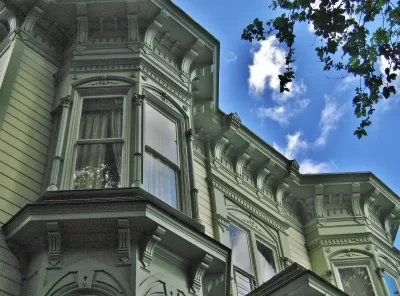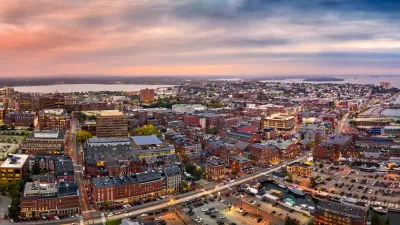A longtime resident of an old, eclectic neighborhood reflects on what makes the area so desirable and why new places like it are effectively outlawed today.

For decades, Robert Liberty has called Northwest Portland home. Blessed by an eclectic mix of housing types and uses, his neighborhood plays host to diverse residents, young and old, and a collection of small businesses including restaurants, grocers, dry cleaners, small warehouses, and a sheet metal company.
Liberty laments that despite the obvious character his neighborhood exhibits - and the high premiums residents pay to live there - the area is "illegal" in most modern zoning schemes. He writes, "residential zoning today has carried class separation to great extremes, which you can see if you travel by air: Over here, big single-family homes on big lots. Over there a mobile home park."
The desire to preserve parking, to segregate immigrants and the poor, and to guard land value and "neighborhood character" has led, ironically, to a shortage of adaptable urban environments. Liberty concludes, "Does that mean do away with all regulations? No. But it does mean that we need to stop assuming that everyone wants to, or can afford to, live in a big-house on a big lot in a residential-only neighborhood."
FULL STORY: My illegal neighborhood

Maui's Vacation Rental Debate Turns Ugly
Verbal attacks, misinformation campaigns and fistfights plague a high-stakes debate to convert thousands of vacation rentals into long-term housing.

Planetizen Federal Action Tracker
A weekly monitor of how Trump’s orders and actions are impacting planners and planning in America.

San Francisco Suspends Traffic Calming Amidst Record Deaths
Citing “a challenging fiscal landscape,” the city will cease the program on the heels of 42 traffic deaths, including 24 pedestrians.

Defunct Pittsburgh Power Plant to Become Residential Tower
A decommissioned steam heat plant will be redeveloped into almost 100 affordable housing units.

Trump Prompts Restructuring of Transportation Research Board in “Unprecedented Overreach”
The TRB has eliminated more than half of its committees including those focused on climate, equity, and cities.

Amtrak Rolls Out New Orleans to Alabama “Mardi Gras” Train
The new service will operate morning and evening departures between Mobile and New Orleans.
Urban Design for Planners 1: Software Tools
This six-course series explores essential urban design concepts using open source software and equips planners with the tools they need to participate fully in the urban design process.
Planning for Universal Design
Learn the tools for implementing Universal Design in planning regulations.
Heyer Gruel & Associates PA
JM Goldson LLC
Custer County Colorado
City of Camden Redevelopment Agency
City of Astoria
Transportation Research & Education Center (TREC) at Portland State University
Jefferson Parish Government
Camden Redevelopment Agency
City of Claremont





























